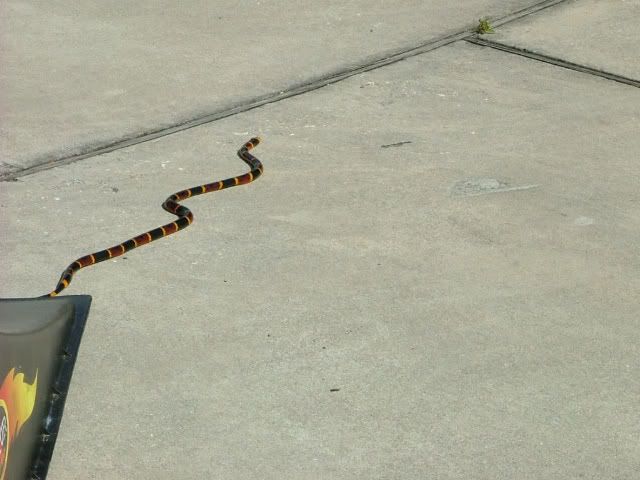According to 5/24/10 Tampa tribune:
Coral snake antivenin supply running out (link)
TAMPA - Here's something you don't want to experience while cleaning out dead brush from under your deck: a nip on the finger from a slender yellow, red and black snake.
If the color schemes follow the "red-to-yellow" motif, you could be in trouble, even if you don't feel any immediate pain.
The venom from the coral snake can take as long as 18 hours to manifest, or it could hit you right away. Left untreated, it can kill by shutting down a victim's lungs.
The good news is that there is antivenin for coral snake bites. The bad news is that the one manufacturer that made the stuff is no longer making it. Come October, the last batch of coral snake antivenin hits its expiration date.
So little antivenin is used through the course of a year it isn't profitable for drug companies to invest millions of dollars in studies, tests and manufacturing.
The federal Food and Drug Administration will test the existing antivenin batch in October and could grant permission to administer it for another year, giving researchers more time to come up with an alternative, said Cynthia Lewis-Younger, medical director for the Florida Poison Information Center in Tampa.
The center has set up an information page on its website, www. poisoncentertampa.org.
"We believe it is likely that the existing (antivenin) lot will be extended for another year," Lewis-Younger said. "However, at some point, probably next year, we will have exhausted all that antivenin."
Medical care providers are concerned about the antivenin issue but hopeful another one will be developed to take its place, Lewis-Younger said. Researchers are working on three possible alternatives, including Coralmyn, which is the most likely antivenin to take the place of the existing one, she said. None of the three have been approved by the FDA.
The problem lies in the cost to develop a vaccine that isn't used that often, she said. The national average is about 100 coral snake bites a year.
"The risk, if you don't get treatment, is that you may die," she said. "If you do go into a hospital and don't get the antivenin, you may end up on a ventilator for many weeks. It's not a good alternative and it's much more expensive than having the antivenin."
Coral snake bite victims go through at least three 10 milliliter vials of antivenin. Each costs $1,560, Lewis-Younger said.
Over the past 10 years, she said, Florida has led the nation in coral snake bites, with an average of slightly fewer than 50 a year. Still, that's not a significant number.
"It's a pretty rare bite," she said. Florida's coral snake bites usually are in the central part of the state, including Hillsborough and Polk counties. She called the area "a hotbed of where bites occur."
The antivenin about to expire was made by Wyeth Pharmaceuticals, which recently merged with Pfizer. Wyeth no longer manufactures the antivenin.
In July 2009, an FDA advisory board gave Coralmyn, the most likely alternative, a fast-track for accelerated approval, but no manufacturers have stepped up to invest what could be as much as $5 million for the required studies.
Coralmyn is made in Mexico. Jim Maister, clinical pharmacist in the critical care unit of the University Community Hospital, said that although it is not yet approved by the FDA, use of Coralmyn is allowed in cases when a person's life is at stake.
Patients with coral snake bites who seek treatment at University Community won't have to wait long for the antivenin, as vials of antivenin can transported to the hospital within an hour or so, he said.
Still, he said, the October expiration of the only approved coral snake bite antivenin could become an issue, especially in Florida, a natural home to the deadly snake.
"It is a bit concerning," Mainster said.








